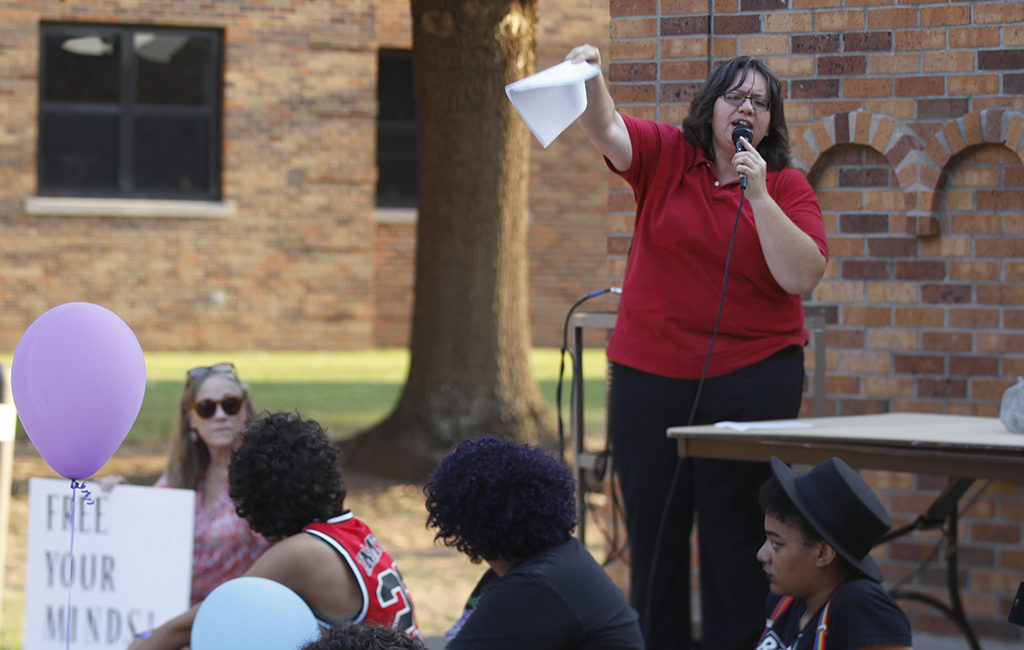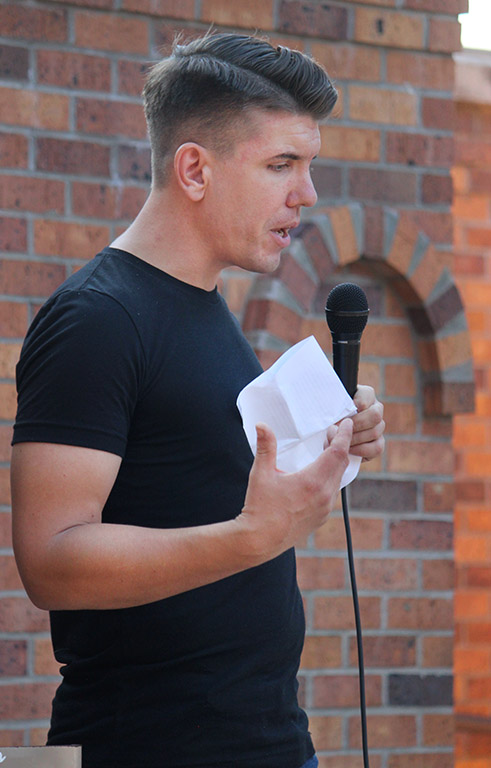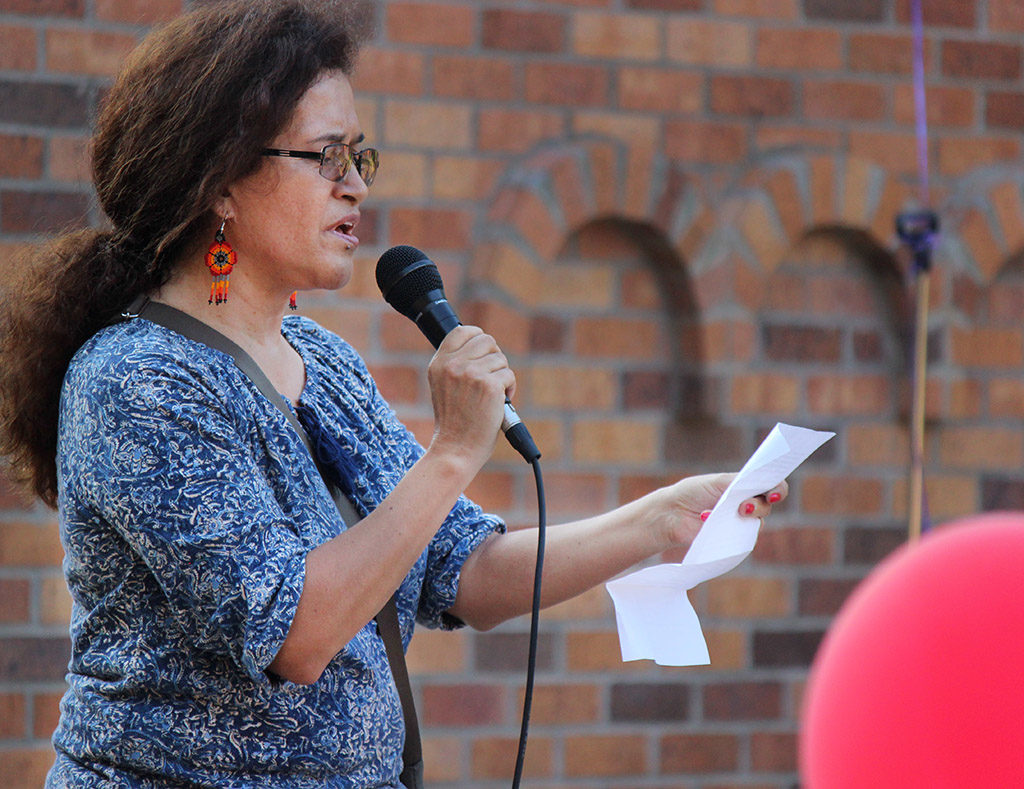
Indivisible Wichita Falls partnered with Kalli Root, English junior, and PRIDE to host the Resist Hate rally at the Sunwatcher Plaza on Sept. 1. Root invited three speakers to the rally: Nathan Jun, associate professor of philosophy, Mel Martinez, pastor at Metropolitan Community Church, and Claudia Montoya, associate professor of Spanish.
“I asked Dr. Jun because he did a fascism in the age of Trump lecture last semester, and he addressed the alt-right and a lot of the things that we are protesting here today,” Root said. “So I feel that he is very knowledgable and has a strong stance on anti-hatred and will be able to speak eloquently on that matter.”
Root said she was connected with Martinez through Indivisible Wichita Falls, and she thought it would be a good idea to give religious people a voice in this rally.
“We thought it would be a really good idea to have a pastor here who can speak on behalf of peace. That also gives us a wider reach to a lot of people who might have written us off beforehand,” Root said.
She added Montoya because she has experience in this area, as well.
“Dr. Montoya has spoken about resisting hate and is also very knowledgeable on these issues,” Root said. “She has a passionate position.”
As the student organizer, Root said that her position was stressful, yet exciting.
“I’ve never done anything like this before,” Root said. “It was kind of cool to learn the steps you have to go through to put something like this together.”
Jun said that he was volunteered to be a speaker because he supported Indivisible Wichita Falls’s aim to raise awareness against hatred and xenophobia.
“Speaking for myself, these events are important for a number of reasons,” Jun said. “One of them is that they demonstrate for marginalized and vulnerable people. It shows people who have been harmed by bigotry that they have allies and they have people who want to help them and protect them.”
Montoya said she was interested in becoming the guest speaker because of her support for non-violence demonstrations and her belief that all human beings, of all backgrounds, aspire to be reach the pursuit of happiness.
“I have travelled the world and I’ve learned that we all are the same. We all want happiness. I think that the world doesn’t have anymore space for hate,” Montoya said. “So that’s what motivates me.”

Jun also explained that demonstrations empowers vulnerable people because of the the sense of solidarity they have with others.
“Speaking truth to power is much easier to do with the solidarity of the people,” Jun said.
Many students said that their goals in participating in this rally were to inform the public that MSU stands against hatred as well as supports other students.
“I expect like-minded people to get together and make sure that the MSU campus will know that hate will not be tolerated here,” Catherine Stepniak, psychology and sociology senior, said. “I also imagine that this rally will make more students feel welcomed here.”
Many student also said that they participated in this rally in order to take a stand against hatred.
“Anything that’s like ‘hey, don’t be hateful’, I want to support that,” Lia Wiley, radiology sophomore, said.
Montoya said that the her goal in participating in this rally was to promote the diversity of MSU and the Wichita Falls community.
“We have so many students that feel vulnerable because to their sexual orientation and their religious affiliation,” Montoya said. “So coming to these rallies is a way to show them support.”
In her speech, Montoya said that standing up against hatred is important because it has a domino affect and will continue to hurt the next person.
“It is important not to be quiet about it. Not only because it hurts you but because if it hurts you, sooner or later it’s going to hurt somebody else and visa versa,” Montoya said. “If it hurts someone else, sooner or later, it’s going to hurt you.”
The events in Charlottesville, Virginia affected Jun personally because he had many friends who were members of the anti-fascist movement and were counterprotesting.
“My friends could have been killed by fascists that day,” Jun said. “I applaud people who are willing to put themselves at risk, but I just don’t want these people to get hurt or killed needlessly.”
As a member of the antifa movement, Jun said in his speech that he is the grandson of a Holocaust survivor.
“When I was 18 years old, I was beaten within an inch of my life by neo-Nazi skinheads,” Jun said. “I still have the scare on my face to bear witness of that assault.”
According to Martinez, the Metropolitan Community Church was founded in 1968 and it is a safe haven for LGBT people to worship. The Metropolitan Community Church promotes the issues of social justice in both the local and national level.
“We knew that there was server prejudice LGBT people because they were being kicked out of their churches,” Martinez said. “We are active from local levels, like this up to the national government, having members of president Obama’s advisory group. We hope to continue to do that kind of leadership work.”
Martinez said that the Metropolitan Community Church offers a place for LGBT individuals to have an open dialogue as well offers an opportunity to raise awareness of LGBT issues.
“We are active in the community to remind folks that LGBT people are just like them,” Martinez said. “We’re part of the community, contribute to the community, hold jobs and pay taxes. We believe that these relationships breaks down borders between people.”

According to Montoya, the events in Charlottesville and the actions of the United States government proves that the United States still has a problem with xenophobia.
“The rally that we saw in Charlottesville is an example of xenophobia,” Montoya said. “The speech that the president has given when he was running for president shows you that we do have a problem with hate and xenophobia. When he talks about undocumented immigrants, that’s xenophobia.”
Jun said that the U.S. has always had a problem with xenophobia and that the root cause of it is ignorance.
“We tend to fear those things we don’t know,” Jun said. “When we are in a state of ignorance about the other, we obviously don’t know the other. And it’s a short step from fearing to hating the other.”
Despite being on a Labor Day weekend, Montoya said that the rally was a success.
“The people know what they came for. I would have loved to see more people that were undecided about these issues so that they had something to learn,” Montoya said. “However, it’s good to see the new generation protesting, manifesting and expressing themselves. I would have probably changed the date. Labor Day weekend is not a good date.”
Martinez said that the rally was successful because it offered students and faculty the opportunity to express their views and inform themselves. She also said that the rally could have been advertised more so that the attendance could have been bigger.
“Anytime people gather together and share their views and learn from one another is a success,” Martinez said. “I would have loved to have to have publicized it even bigger and have a much bigger crowd.”
Root said that the rally was successful because of attendance, the positive message the rally sent and the encouragement the rally received from the community.
“We had a decent amount of people here. We spread a really positive message and we kept it from devolving into anything negative or hostile,” Root said. “We had a good audience and support from the community. We had a lot of drivers honking in solidarity while we were marching on the streets as we were passing by. So yeah, it was a success.”
However, Root said that she would have loved to increase the turnout.
“The bigger the audience, the further your message is going to get across,” Root said.






















